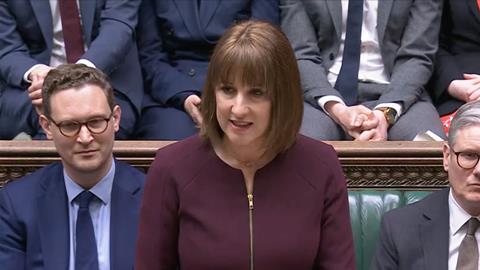While Rachel Reeves’ spring statement was devoid of a ‘proper investment plan’ for justice, it did propose a crackdown on advisers who promote tax avoidance schemes – with fines running into millions
Rachel Reeves’ spring statement was something of a non-event for lawyers. No sign of the chancellor removing the national insurance tax break for equity partners in LLPs, for example. Justice did make a fleeting appearance in the form of £8m from a new £3.25bn ‘transformation fund’ to reduce the amount of ‘form filling’ probation officers have to do.
The Law Society was relieved not to see justice cuts announced, but bemoaned the absence of a ‘proper investment plan’. Chief executive Ian Jeffery said: ‘A fair and effective justice system requires greater funding and bold decisions. The upcoming spending review needs to provide more funding and resources to fix the courts system, boost legal aid and protect our communities.’
More significant was a consultation document published alongside the spring statement heralding a clampdown on advisers who promote tax avoidance schemes.
Fines for ‘legal professionals’ who ‘undermine the tax system’ could run into millions of pounds under new powers proposed by the government. HM Revenue & Customs will also get new powers to obtain information from tax advisers and to publish the details of advisers subject to HMRC sanctions.
According to the document, advice facilitating ‘non-compliance’ is responsible for a ‘tax gap’ of 4.8% of theoretical liabilities. In 2022/23 this added up to £39.8bn.
The new proposed powers include:
- Raising the financial penalty for dishonest conduct from the current maximum of £50,000 to one based on the potential loss of tax revenue. ‘Where the non-compliance causes significant harm to the tax system, this could result in a penalty of millions of pounds.’
- Enhancing powers to enable HMRC to investigate and request information from tax advisers. This includes allowing HMRC to request information ‘where HMRC reasonably suspects the tax adviser has facilitated the inaccuracy in a taxpayer’s document or return’.
- Broadening the scope of disclosure to professional bodies.
- Publishing details of individuals or businesses subject to an HMRC sanction. ‘By reviewing published information, taxpayers can make informed choices about which tax advisers to use or avoid’.
HMRC intends to engage with legal regulators ‘to discuss the operation of their codes of conduct and how HMRC can better support them to take the most effective appropriate action against their members when they are breaching these rules’.
Introducing the consultation document, James Murray MP, exchequer secretary to the Treasury, said: ‘Most tax advisers in the UK are dedicated professionals who adhere to rigorous standards, helping millions of taxpayers pay the right tax. However, a minority of advisers fall short of these standards. Their actions can facilitate non-compliance and contribute to the tax gap. This undermines trust in both the tax system and honest tax advisers.’
'Lawyers, almost exclusively barristers, provide opinions that the schemes are lawful, and DOTAS disclosure is not required. The courts almost always conclude the opposite'
Dan Neidle, tax lawyer
Former Clifford Chance tax partner Dan Neidle welcomed the proposals as ‘probably the toughest ever introduced’.
Neidle later said on X: ‘There is a mini-industry of creating tax avoidance schemes which have no prospect of success. We don’t believe a single one has succeeded in court in the last 20 years. For the first time, there is a proposal to criminalise the promoters’ activity.’
Targeting legal professionals is ‘likely the most controversial part’ of the plans, Neidle added. Lawyers, almost exclusively barristers, ‘provide opinions that the schemes are lawful, and DOTAS [Disclosure of Tax Avoidance Schemes] disclosure is not required. The courts almost always conclude the opposite. But the role of the barrister was not really to provide correct advice; it was to facilitate the scheme. The promoters can then claim “we have a KC opinion”.
‘When the opinion turns out to be wrong, the end-users of the scheme cannot sue the KC, because they weren’t the client – the promoter was. And the promoter has done just fine. The opinion serves two purposes. It greatly helps marketing the scheme. And it gives the promoters a defence against penalties or criminal prosecution – after all, they received legal advice. The advice itself will almost always be privileged – HMRC cannot see it. Nothing has been done. Ideally, the Bar Standards Board would act.’
Also problematic for HMRC are claims that certain documents are privileged when they are not, purely to prevent the authority from obtaining relevant information about tax avoidance schemes. New guidance will set out HMRC’s position on circumstances when privilege applies, to ‘challenge inappropriate claims of privilege before the tribunal’.





































7 Readers' comments